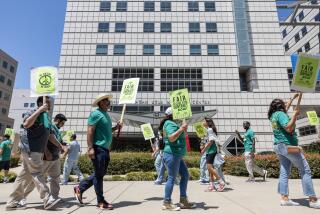Unions Battle Universal Over ‘Human Issues’
UNIVERSAL CITY — A coalition of labor unions has joined the zoning battle over the expansion of Universal Studios by seeking better jobs and benefits for workers as a condition of approving the development.
Their untested theory is that such economic factors should be considered in making land-use decisions.
“We think human issues are as much part of the environment as traffic and pollution,” said Maria Elena Durazo of the Hotel Employees and Restaurant Employees Local 11. “If people can’t afford to live based on wages they are earning, what does that do to neighborhoods?”
Union leaders said they want Universal, which states that 90% of its work force is unionized, to commit to future high-paying union jobs with benefits at the expanded facilities, not low-wage service jobs. And they want to use zoning and environmental regulations to further that goal. Union leaders point to CityWalk, where no workers are union members.
The strategy is to use union political leverage with elected members of the Los Angeles City Council and the Los Angeles County Board of Supervisors, both of which must approve the expansion.
Madeline Janis-Aparicio, spokeswoman for a new labor coalition organized for the effort, said the group has hired an attorney to research how much economic considerations can weigh into land-use decisions.
“We understand the limitations, and we think there are ways to push the envelope,” she said. “If Universal wants it to go smoothly, they should consider these issues.”
Universal officials contend it’s just another way for the unions to exert pressure at the bargaining table.
The expansion doesn’t have anything to do with union contracts, some of which are now being negotiated, said company spokesman Jim Yeager.
“We will continue to negotiate without drawing in unrelated and unassociated issues,” he said.
It’s been estimated that Universal’s proposed expansion would create 8,300 new jobs, of which about 40% would be office jobs. Other jobs would be in the theme park, restaurants and hotels. Theme park jobs start at minimum wage, and can rise to more than $10 an hour with experience, Yeager said.
Yeager said studies of the proposed development have shown it would create a range of jobs at varying salary levels--a mix of positions, in short, necessary for healthy economic growth. He said the company’s wages and benefits are good compared with other nonunionized theme parks.
‘Nexus Between Land Use, Economy’
Pressing a union agenda through land use is something “the unions are doing more and more,” said Mott Smith, editor of a trade journal called the Planning Report.
“Unions naturally have a huge interest in the way land is used,” he said. “People are finally seeing nexus between land use and the economy.”
Elsewhere in the state, labor unions have fought against zoning for retail stores whose labor practices they dislike, Mott said.
Universal plans to expand the square footage of its development atop the Universal City hill by about 60% over the next 15 years, a total of about 3.2 million square feet of buildings and developed areas. The expansion may include 1.2 million square feet of office space, 1,200 hotel rooms, a 50% expansion of the theme park and a smaller-scale version of CityWalk.
Because the development lies partly within L.A. city limits and partly in unincorporated Los Angeles County, Universal must get approval from both. Final votes on the plan aren’t expected until the fall.
The proposal has met with vigorous opposition from neighboring homeowners worried about long lines of cars and annoying din. The outcry has been so great that Supervisor Zev Yaroslavsky and City Council President John Ferraro helped broker a deal with Universal to scale back its original plan by about 44%.
The compromise has mellowed but not extinguished the neighborhood opposition, which now stands poised to join forces with the new union-driven effort, county officials say. The combination, local politicians said, could multiply headaches for Universal, which has already had plenty over the expansion plan.
The new group, the Coalition for Accountability in the Universal Studios Expansion (CAUSE), includes representatives of the Los Angeles County Federation of Labor, the Hotel Employees and Restaurant Employees (HERE), the International Alliance of Theatrical and Stage Employees (IATSE), the carpenters union, the Teamsters, the IBEW, the Building Trades Council, the Professional Musicians union and other activist groups such as the NAACP.
In all, the group claims to have united 60 labor, community and church groups under the slogan “Fight Universal poverty.”
Members say they have been quietly working to oppose the expansion for some months, and recently launched a letter-writing campaign to lobby politicians. They plan to hold a news conference and protest Thursday at the Universal offices.
The group is demanding commitments from Universal to pay employees of the expanded development so-called “living wages” above minimum wage, hire workers locally and address related issues such as the supply of affordable housing in the area. Universal has not yet developed a position on the issues.
“We see ourselves as building a movement,” said Janis-Aparicio, spokeswoman for the group.
‘Opportunity to Shake People Up’
Universal’s plans “symbolize the trend to a service economy and low-wage, no-benefits jobs,” she said. “It has everything to do with a lot of trends in development throughout Los Angeles and the country. . . . We think we have an opportunity here to shake people up.”
Union spokesmen said part of the concern stems from simmering disputes with Universal over existing labor issues. Several union representatives interviewed said Universal was abiding by the letter of current contracts but was leasing facilities and forging agreements with nonunion companies. Nonunion restaurants and stores on CityWalk are especially irksome to the unions.
Spokesman Yeager said Universal can’t control third-party companies using its facilities, saying that the unions must organize workers in those companies themselves.
One problem with the unions’ tactic is that exacting economic concessions through the zoning approval process may not be possible under state law, said Yaroslavsky. Local governments do exert considerable muscle over developers’ plans, but only to the extent that those plans alter the physical environment, he said.
“It’s a very dicey area,” he said. “I am sympathetic to the employees . . . but I don’t know how under the law we can connect these two issues” of environmental concerns and economics.
“I don’t think it’s something the courts could hold up,” agreed David Myers, a Palmdale city councilman and head of Leadership Southern California, a group that has studied the economic impacts of land use.
Tactic Could ‘Drive Economy to a Halt’
Myers called the unions’ tactic “an artificial thing” that if successful could “drive the economy to a halt.”
A collaboration of homeowners groups and unions has in the past proved a formidable force, particularly in Los Angeles politics.
“The unions are very powerful,” Ferraro said.
City Councilwoman Jackie Goldberg, a strong union supporter, gave a hint of the battles to come.
The unions’ involvement “might affect my vote,” she said.
“Everyone in this city is worried about the gap” between rich and poor, she said. “We should more broadly look at the question, even if it’s not technically part of the law.”
More to Read
Sign up for Essential California
The most important California stories and recommendations in your inbox every morning.
You may occasionally receive promotional content from the Los Angeles Times.









